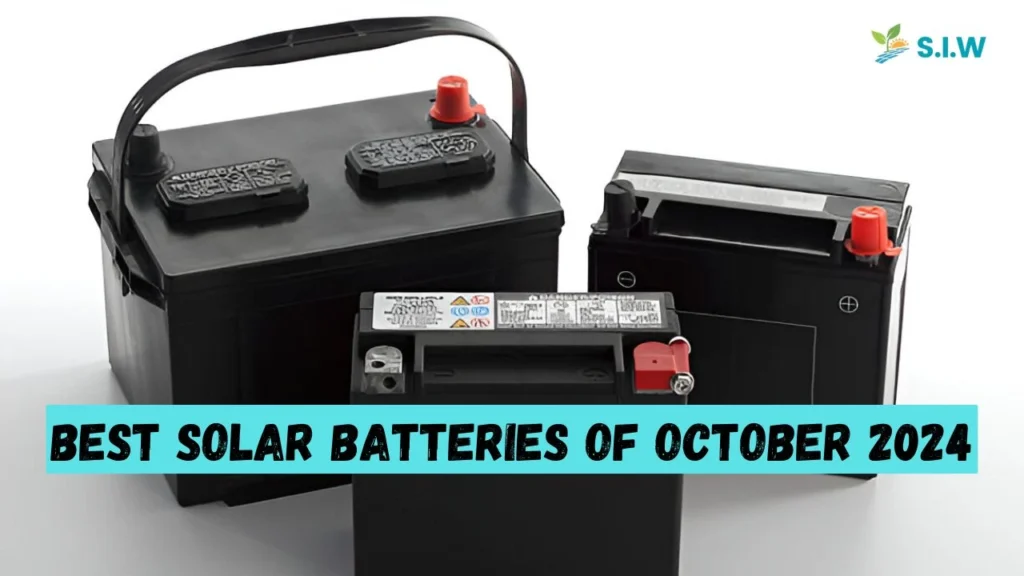With advancements in solar technology, choosing the right solar battery is essential to maximize energy savings and ensure a reliable backup during outages. In October 2024, the market offers a range of high-performance batteries tailored for varying storage capacities, power outputs, and functionalities. This guide delves into the best options currently available, helping you make an informed decision for sustainable energy storage.
Top Solar Batteries for Residential Use
1. Tesla Powerwall 2
Tesla’s Powerwall 2 remains a popular choice for households due to its 13.5 kWh storage capacity and 5 kW continuous output, making it suitable for basic home needs. Its AC-coupled lithium-ion structure provides excellent energy density and seamless integration with other Tesla products like EV chargers. One of its major benefits is its unlimited cycle warranty for ten years, making it a durable option. The Powerwall 2 is particularly efficient with a round-trip efficiency of 90%, and its sleek, compact design fits well in smaller spaces. However, Tesla’s limited customer service has been a downside for some users.
2. LG RESU Prime
Known for high efficiency, the LG RESU Prime comes with capacities of 9.6 kWh and 16 kWh, ideal for high energy consumption. It is a DC-coupled battery, providing up to 7 kW peak power and 97.5% round-trip efficiency. The LG RESU Prime is versatile and modular, suitable for growing families with increasing energy needs. It has a 10-year warranty covering up to 32 MWh throughput, but its DC coupling may be challenging to integrate into some existing solar setups.
3. Generac PWRcell
Generac’s PWRcell is known for modularity and customization, with each module providing 3 kWh of capacity. Multiple modules can be stacked, allowing for tailored energy storage solutions. With a 96.5% efficiency and backup capabilities, the Generac PWRcell can support both solar self-consumption and backup. It is suited for users who need flexibility in storage as needs evolve. Although it’s ideal for time-of-use rates and essential appliances during outages, its DC coupling could be a drawback if integrating with certain systems.
4. Enphase IQ 5P
Enphase’s IQ 5P is one of the top choices for households requiring a 5 kWh modular storage with 98% depth of discharge. It features 3.84 kW continuous output and can be easily expanded by stacking additional modules. The Enphase IQ 5P is backed by a 15-year warranty with up to 6,000 cycles, ensuring longevity and reliability. However, compatibility issues may arise with older Enphase systems, so it’s crucial to check if your existing setup is compatible.
5. SunPower SunVault
SunPower, a leader in solar energy, offers the SunVault, available in 13 kWh and 16 kWh capacities. It’s designed for high power demands, providing 10 kW of peak output and a solid 86% efficiency. SunVault is AC-coupled and can be seamlessly integrated with SunPower’s solar panels, making it an excellent choice for whole-home backup. While it has an unlimited cycle warranty, its slightly lower efficiency and high cost may not suit all budgets.
Key Considerations When Choosing a Solar Battery
- Capacity (kWh): The storage capacity determines how long your battery will power your home. For essential loads, 10–15 kWh is typically sufficient, while whole-home backups may require 20+ kWh.
- Power Output (kW): Continuous output indicates the amount of power that the battery can provide consistently. A higher output is beneficial if you need to run larger appliances like HVAC units.
- Efficiency: Round-trip efficiency is essential as it affects how much of the stored energy is usable. A higher percentage, like the 96–98% seen in top models, is preferable.
- Depth of Discharge (DoD): Batteries with higher DoD can utilize more of their stored energy without degrading prematurely. A DoD of 90–100% is optimal for maximizing performance.
- Warranty and Cycle Life: Warranties typically cover a set number of cycles or a percentage of capacity retention over time. Longer warranties (10–15 years) are ideal for ensuring the battery’s longevity.
Frequently Asked Questions (FAQs)
- Can a solar battery power my entire home?
Yes, but it depends on the battery’s capacity. Larger capacity batteries, like the LG RESU Prime and Tesla Powerwall 2, are suitable for whole-home backup if sized appropriately. - What is the difference between AC-coupled and DC-coupled batteries?
AC-coupled batteries integrate easily with existing solar setups, while DC-coupled batteries are generally more efficient but harder to install in pre-existing systems. - How long do solar batteries last?
Most high-quality solar batteries last between 10–15 years, depending on cycle life and maintenance. - Are there tax incentives for solar battery installations?
Yes, many regions offer incentives, including a 30% federal tax credit in the U.S. Financing options may also be available through solar installers.








